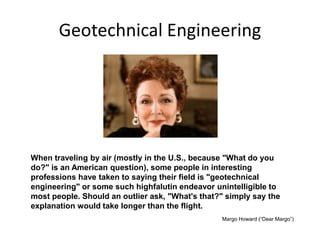9 Easy Facts About Geotheta Shown
Table of ContentsA Biased View of GeothetaGeotheta for DummiesSome Of GeothetaAll About GeothetaGet This Report about Geotheta

They perform site investigations, gather examples, do lab tests, and assess information to examine the viability of the ground for construction tasks - Consulting Engineers. Based upon their searchings for, geotechnical engineers supply referrals for foundation design, incline security, preserving frameworks, and reduction of geotechnical risks. They team up with other experts, such as architects, structural engineers, and building groups, to guarantee that geotechnical factors to consider are integrated into the general task design and execution
By evaluating the actions and residential properties of dirt and rock, they can determine potential geotechnical risks such as landslides, soil settlement, or incline instability. Their know-how helps avoid failings or mishaps that could endanger lives and residential or commercial property. Below are some thorough obligations and responsibilities of a geotechnical designer: Site Investigation: Geotechnical engineers conduct website investigations to collect information on subsurface problems.
They interpret the information to understand the buildings and behavior of the soil and rock, including their strength, leaks in the structure, compaction attributes, and groundwater problems. Geotechnical Analysis and Style: Geotechnical designers examine the data gathered during site investigations to examine the security and viability of the website for construction jobs. They do geotechnical computations and modeling to examine aspects such as birthing capacity, negotiation, incline security, side earth pressures, and groundwater circulation.
The 6-Second Trick For Geotheta
Foundation Layout: Geotechnical engineers play a critical function in making structures that can securely sustain the intended structure. They evaluate the soil conditions and load requirements to identify the suitable structure type, such as superficial structures (e.g., footings), deep structures (e.g (https://yoomark.com/content/httpsgeothetacom)., stacks), or specialized techniques like soil improvement. They think about variables such as negotiation limitations, bearing capacity, and soil-structure interaction to create ideal foundation styles
They review building strategies, display website activities, and carry out field examinations to verify that the design recommendations are followed. If unforeseen geotechnical issues emerge, they examine the circumstance and offer recommendations for remediation or changes to the layout. Threat Analysis and Mitigation: Geotechnical designers evaluate geotechnical dangers and risks connected with the job website, such as landslides, liquefaction, or soil disintegration.

Partnership and Interaction: Geotechnical designers work closely with various other specialists associated with a job, such as designers, structural designers, and building and construction teams. Efficient interaction and collaboration are vital to incorporate geotechnical factors to consider right into the overall task design and construction process. Geotechnical designers give technical expertise, answer queries, and ensure that geotechnical demands are met.
Facts About Geotheta Uncovered
Below are some types of geotechnical engineers: Structure Engineer: Structure engineers concentrate on designing and evaluating structures for frameworks. They assess the soil problems, lots needs, and website qualities to determine the most appropriate foundation type and style, such as shallow structures, deep foundations, or specialized methods like stack foundations.
They assess the elements influencing slope stability, such as dirt residential properties, groundwater problems, and slope geometry, and establish techniques to stop incline failures and alleviate dangers. Earthquake Engineer: Quake designers concentrate on assessing and making frameworks to hold up against seismic pressures. They examine the seismic danger of a site, assess soil liquefaction possibility, and establish seismic style requirements to guarantee the safety and resilience of structures during quakes.
They execute field testing, gather examples, and examine the accumulated data to define the dirt homes, geologic developments, and groundwater problems at a site. Geotechnical Instrumentation Designer: Geotechnical instrumentation designers concentrate on surveillance and gauging the actions of soil, rock, and frameworks. They mount and preserve instrumentation systems that keep an eye on elements such as soil settlement, groundwater degrees, slope motions, and structural displacements to assess performance and provide very early cautions of possible problems.
Some Known Details About Geotheta
They perform tests such as triaxial examinations, loan consolidation examinations, direct shear examinations, and leaks in the structure examinations to gather data for geotechnical analysis and style. Geosynthetics Engineer: Geosynthetics engineers concentrate on the design and application of geosynthetic materials, such as geotextiles, geogrids, and geomembranes. They use these products to enhance dirt stability, enhance slopes, offer water drainage solutions, and control erosion.
They tend to be investigative individuals, which implies they're intellectual, introspective, and analytical. They are curious, methodical, logical, Going Here analytical, and logical. Some of them are also social, implying they're kind, generous, participating, person, caring, useful, empathetic, tactful, and pleasant - Geo Tech Engineering.
In the office atmosphere, geotechnical engineers use specialized software application devices to do estimations, develop layouts, and examine information. They prepare records, testimonial task requirements, communicate with clients and staff member, and coordinate project activities. The workplace setup gives a conducive environment for research study, evaluation, and collaboration with various other experts associated with the job.
Geotheta Can Be Fun For Everyone
They regularly go to task sites to carry out website examinations, evaluate geotechnical problems, and gather data for evaluation. These check outs entail traveling to different areas, occasionally in remote or challenging terrains. Geotechnical designers may perform soil tasting, conduct tests, and screen building and construction activities to ensure that the geotechnical elements of the task are being executed appropriately.
Geotechnical engineers also work in specialized geotechnical labs. Geotechnical lab designers function extensively in these environments, managing testing devices, operating instruments, and taping data.